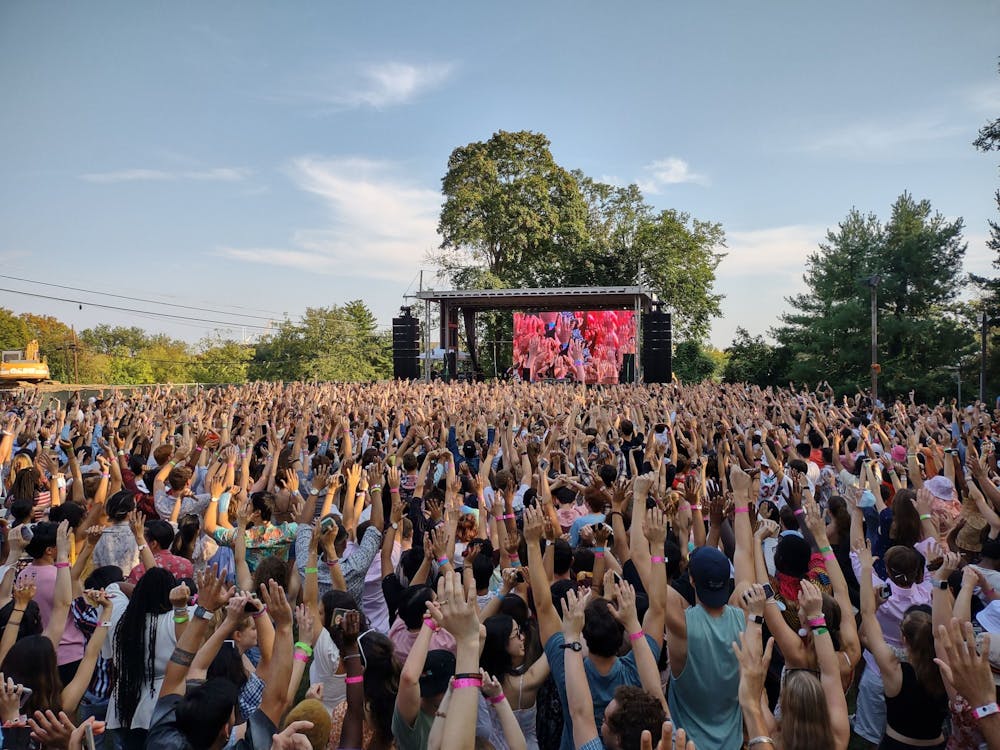On the day before Lawnparties, I discovered that the theme of the biannual Princeton music festival was “preppy.” Following this theme would mean demonstrating my knowledge of country club etiquette or flaunting my substantial Sperrys collection, neither of which I happened to possess. Thus, I was initially hesitant to adopt the style. But after voicing this concern to my friends, I was informed that I would be lacking in school spirit if I did not choose to sport my “preppiest” articles of clothing that afternoon. Eventually, I conceded. And, as I would discover the next day, so had many of my peers.
This preppy Lawnparties groupthink resulted in a homogeneity that limited students’ embrace of authenticity on the day. In order to counteract the effects of the restrictive environment Lawnparties creates, we must reject the theming of all future Lawnparties.
Preppiness possesses a very direct affiliation with elitism: “Preppy” is an adjective whose origins lie in expensive prep schools. Thus, preppiness as a concept is more readily accessible to those from privileged backgrounds. To not only instruct Princeton students to emulate this prep school style, but also to assume that this style will be correctly interpreted by everyone on campus is presumptuous at best and exclusive at worst.
The intensely gendered nature of many students’ outfits also highlighted the restrictive nature of Lawnparties’ theme. Upon leaving my dorm for Prospect Avenue, I was met by hordes of men in flamingo pink shorts and button down shirts, and women in some rendition of the same cotton floral dress. The gendered nature of many students’ outfits was to be expected, given the traditional nature of this theme. To evoke an expensive prep school is to evoke a sense of traditionalism, given that prep school is often paid for by families drowning in old money. Princeton students channeled this tradition through a contrast between hyper-feminine and masculine dress.
Of course, there is nothing wrong with feeling comfortable and confident in clothing that most obviously adheres to one’s gender expression. It is doubtful, however, that every student at Lawnparties naturally expresses gender in the exact same way. For those who do not naturally gravitate toward gendered outfits — myself included — the room allotted for aesthetic exploration and nuance felt severely limited. In 2021, clothing feels relatively removed from one’s gender identity; I feel at liberty to wear button down shirts or sweater vests and expect that my identity as female will still be respected. Lawnparties’ traditional theme worked to reintroduce to campus a deeply antiquated sense of connection between gender and fashion.
Homogeneity is not something I generally associate with the Princeton student body. We host students with some of the most diverse intellectual and academic backgrounds of any university in America. Our campus is replete with published authors, Olympic athletes, and nationally-recognized activists, among many other remarkable students.
The consistently impressive and surprising resumes of Princeton students are no secret — it is a source of pride to stand out in courses filled with classmates equally equipped for the rigor of the University. It takes academic excellence to merit a spot in Princeton; to stand out in an academic setting here is therefore an accomplishment worth touting.
There is, then, a striking dichotomy between students’ affinity for notability in the classroom and anonymity on the streets. On Prospect Avenue, it is necessary to fit the status quo and feign uniformity as a means of securing one’s social standing on campus. We know, however, that our student body is anything but uniform. We must stop discouraging physical self expression, and instead work to create a campus culture in which one can self-discover beyond the confines of a 900-square-foot classroom.

The first and easiest step to take in order to achieve this is to un-theme our next Lawnparties. Students at Princeton defy expectations; they are surprising and interesting and comfortable in their quirkiness. We should allow Lawnparties to be a space that reflects this truth by removing all requirements for prep from its fashion criteria.
Andi Grene is a sophomore from New York. She can be reached at agrene@princeton.edu.









